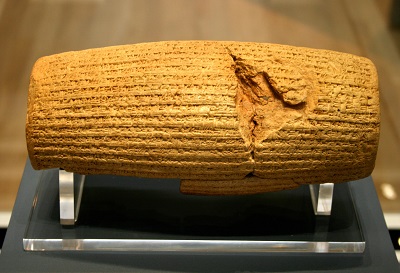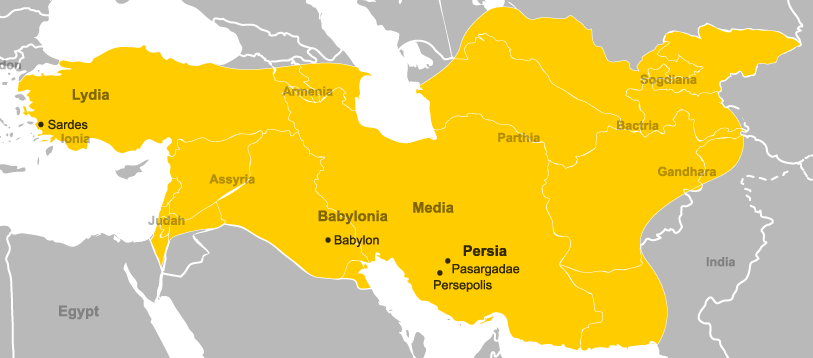Croesus asked the god Apollo through his priestesses at Delphi, whether it was his custom to deceive his benefactors, and whether he was not ashamed to have encouraged the king of Lydia in an enterprise so disastrous?
Continuing Cyrus Begins the Persian Empire,
our selection from A History of Greece by George Grote published in 1856. For works benefiting from the latest research see the “More information” section at the bottom of these pages. The selection is presented in seven easy 5 minute installments.
Previously in Cyrus Begins the Persian Empire.
Time: 600 – 530 BC
Place: Near East

CC BY-SA 4.0 image from Wikipedia.
Had these allies appeared, the war might perhaps have been prosecuted with success. And on the part of the Lacedaemonians, at least, there was no tardiness; for their ships were ready and their troops almost on board, when the unexpected news reached them that Croesus was already ruined. Cyrus had foreseen and forestalled the defensive plan of his enemy. Pushing on with his army to Sardis without delay, he obliged the Lydian prince to give battle with his own unassisted subjects. The open and spacious plain before that town was highly favorable to Lydian cavalry, which at that time (Herodotus tells us) was superior to the Persian. But Cyrus, employing a stratagem whereby this cavalry was rendered unavailable, placed in front of his line the baggage camels, which the Lydian horses could not endure either to smell or to behold. The horsemen of Croesus were thus obliged to dismount; nevertheless they fought bravely on foot, and were not driven into the town till after a sanguinary combat.
Though confined within the walls of his capital, Croesus had still good reason for hoping to hold out until the arrival of his allies, to whom he sent pressing envoys of acceleration. For Sardis was considered impregnable — and one assault had already been repulsed, and the Persians would have been reduced to the slow process of blockade. But on the fourteenth day of the siege, accident did for the besiegers that which they could not have accomplished either by skill or force. Sardis was situated on an outlying peak of the northern side of Tmolus; it was well fortified everywhere except toward the mountain; and on that side the rock was so precipitous and inaccessible, that fortifications were thought unnecessary, nor did the inhabitants believe assault to be possible in that quarter. But Hyroeades, a Persian soldier, having accidentally seen one of the garrison descending this precipitous rock to pick up his helmet which had rolled down, watched his opportunity, tried to climb up, and found it not impracticable; others followed his example, the stronghold was thus seized first, and the whole city speedily taken by storm.
Cyrus had given especial orders to spare the life of Croesus, who was accordingly made prisoner. But preparations were made for a solemn and terrible spectacle; the captive king was destined to be burned in chains, together with fourteen Lydian youths, on a vast pile of wood. We are even told that the pile was already kindled and the victim beyond the reach of human aid, when Apollo sent a miraculous rain to preserve him. As to the general fact of supernatural interposition, in one way or another, Herodotus and Ctesias both agree, though they described differently the particular miracles wrought. It is certain that Croesus, after some time, was released and well treated by his conqueror, and lived to become the confidential adviser of the latter as well as of his son Cambyses: Ctesias also acquaints us that a considerable town and territory near Ekbatana, called Barene, was assigned to him, according to a practice which we shall find not infrequent with the Persian kings.
Continued below the map.

CC BY-SA 3.0 image from Ancient History Encyclopedia.
The prudent counsel and remarks as to the relations between Persians and Lydians, whereby Croesus is said by Herodotus to have first earned this favorable treatment, are hardly worth repeating; but the indignant remonstrance sent by Croesus to the Delphian god is too characteristic to be passed over. He obtained permission from Cyrus to lay upon the holy pavement of the Delphian temple the chains with which he had at first been bound. The Lydian envoys were instructed, after exhibiting to the god these humiliating memorials, to ask whether it was his custom to deceive his benefactors, and whether he was not ashamed to have encouraged the king of Lydia in an enterprise so disastrous? The god, condescending to justify himself by the lips of the priestess, replied: “Not even a god can escape his destiny. Croesus has suffered for the sin of his fifth ancestor (Gyges), who, conspiring with a woman, slew his master and wrongfully seized the scepter. Apollo employed all his influence with the Moerae (Fates) to obtain that this sin might be expiated by the children of Croesus, and not by Croesus himself; but the Moerae would grant nothing more than a postponement of the judgment for three years. Let Croesus know that Apollo has thus procured for him a reign three years longer than his original destiny, after having tried in vain to rescue him altogether. Moreover he sent that rain which at the critical moment extinguished the burning pile. Nor has Croesus any right to complain of the prophecy by which he was encouraged to enter on the war; for when the god told him that he would subvert a great empire, it was his duty to have again inquired which empire the god meant; and if he neither understood the meaning, nor chose to ask for information, he has himself to blame for the result. Besides, Croesus neglected the warning given to him about the acquisition of the Median kingdom by a mule: Cyrus was that mule — son of a Median mother of royal breed, by a Persian father at once of different race and of lower position.”
This triumphant justification extorted even from Croesus himself a full confession that the sin lay with him, and not with the god. It certainly illustrates in a remarkable manner the theological ideas of the time. It shows us how much, in the mind of Herodotus, the facts of the centuries preceding his own, unrecorded as they were by any contemporary authority, tended to cast themselves into a sort of religious drama; the threads of the historical web being in part put together, in part originally spun, for the purpose of setting forth the religious sentiment and doctrine woven in as a pattern. The Pythian priestess predicts to Gyges that the crime which he had committed in assassinating his master would be expiated by his fifth descendant, though, as Herodotus tells us, no one took any notice of this prophecy until it was at last fulfilled: we see thus the history of the first Mermnad king is made up after the catastrophe of the last.
| <—Previous | Master List | Next—> |
More information here and here, and below.
We want to take this site to the next level but we need money to do that. Please contribute directly by signing up at https://www.patreon.com/history
Leave a Reply
You must be logged in to post a comment.